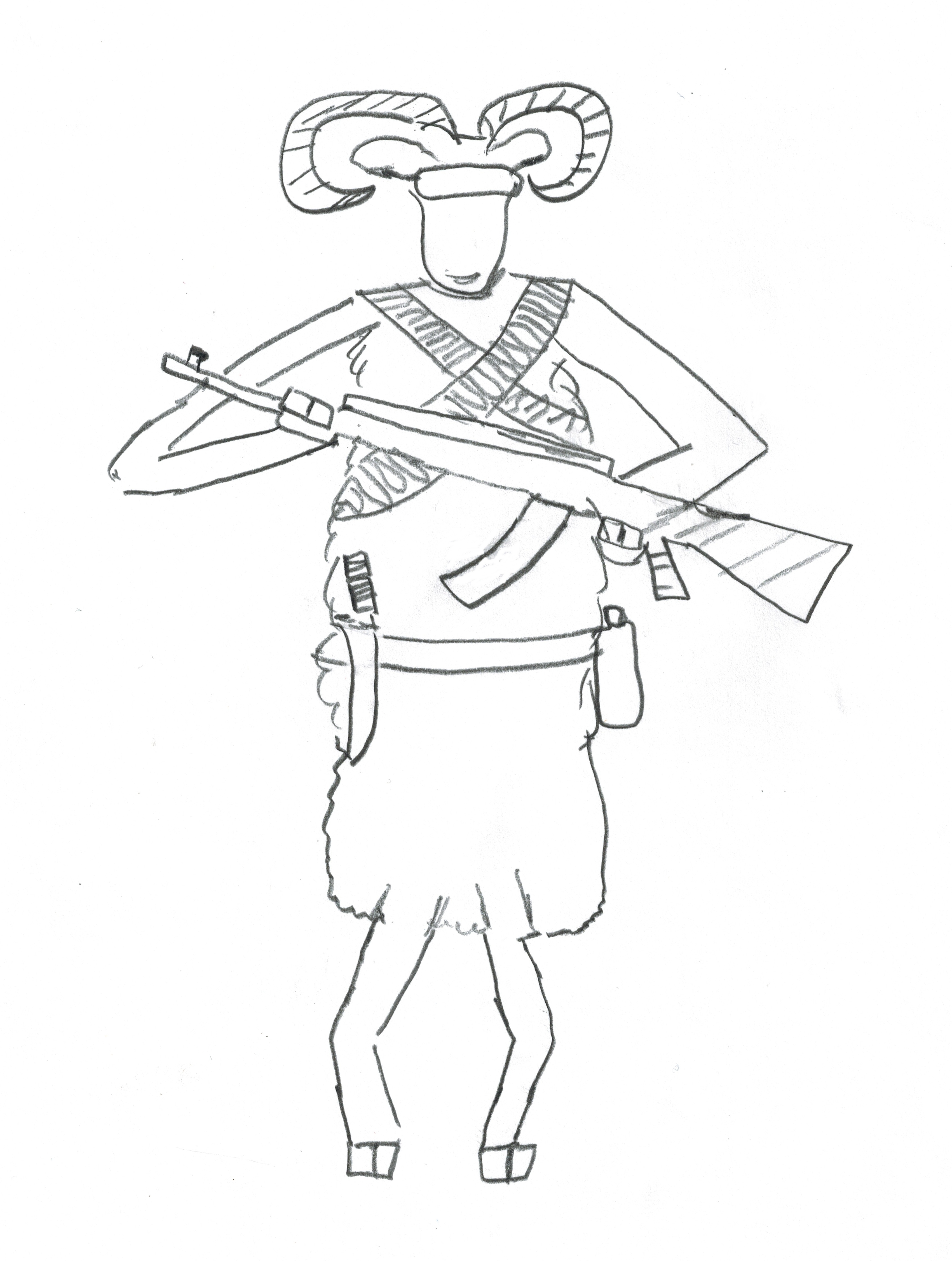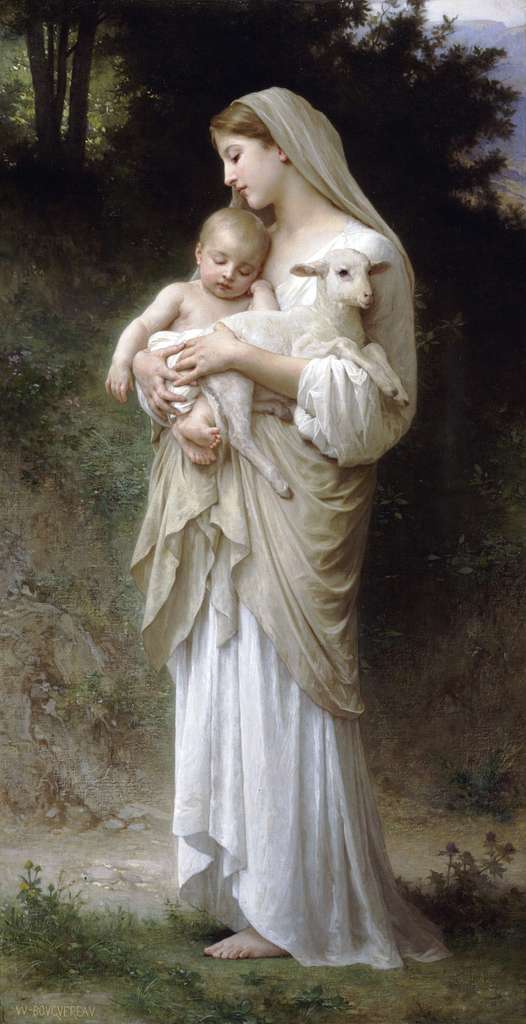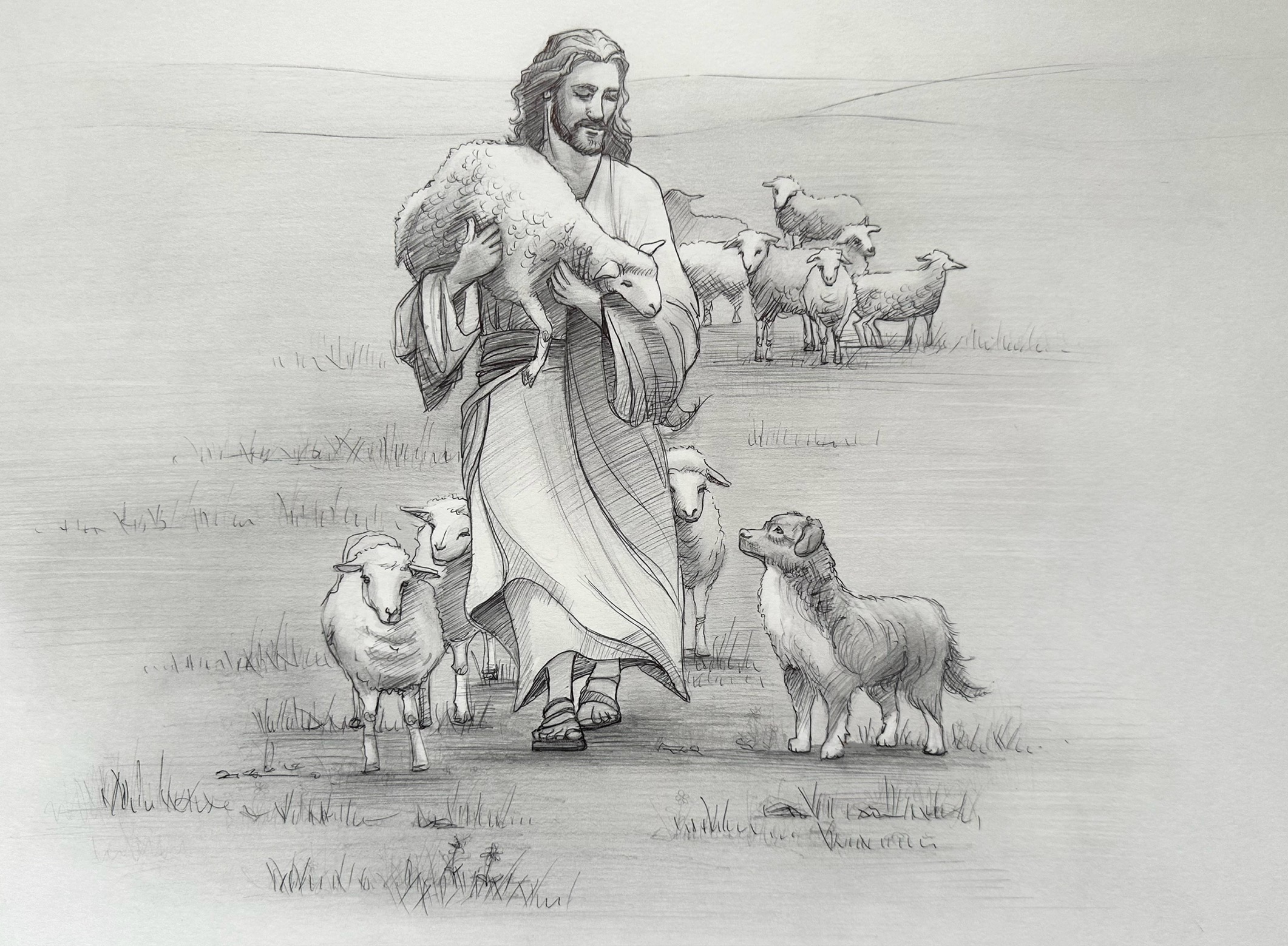Dear Souls & Hearts Member,
This reflection is quite a come-down, I must say; over the past three reflections, we have explored our identities a beloved little son or daughter and an heir of God the Father, and as a friend of Jesus.
Now we are understanding what it means to be a member of Jesus’ flock.
That is, your identity as a sheep.
This is not a flattering image.
But it is a critical identity for us not only to understand, not only for us to accept, but also for us as Catholics to embrace.
I have raised sheep here on our homestead called “Nourishing Acres” for 15 years. A big reason why we do the thing we do on this homestead is to better understand what Jesus meant when he used everyday examples from daily life in the Middle East in Biblical time – examples that are perhaps not so evident to us in our modern Western world.
Ergo, Dr. Peter gets sheep to find out what he himself is like.
Yeah.
Sheep have individual differences – not every sheep is like another, but there are some commonalities. Let’s get into the qualities of sheep that motivated our Lord to liken us human beings to them.
Qualities of sheep
Sheep are absolutely, existentially dependent on their shepherd.
One of the first things I realized as a new shepherd is that domesticated sheep are so far away from their wild ancestors that they are utterly incapable of surviving on their own. Even chickens have a better chance of making in the wild than sheep.
Why?
Because sheep can neither fight nor flee very well.
Sheep depend on their shepherd for everything; food, water, shelter, protection, veterinary care, everything. Just like we are dependent on our Shepherd for everything. Like the branches depend on the grapevine in John 15:5, where Jesus tells us bluntly that “apart from Me you can do nothing.”
Sheep are stubborn, willful, and demonstrate poor judgment.
Left to their own devices, sheep demonstrate abysmal decision-making. They resist hoof trimming, even though leaving hoof untrimmed would result in lame (or dead) sheep, due to infections.
Compared to goats, cows, and especially pigs, sheep find many more ways to harm themselves. I am very careful about not leaving any hay bale strings in the field, as it seems that if I leave even one, a sheep will find a way to tangle itself up in it.
Gene Logsdon, the “Contrary Farmer” has this description of sheep in his book on pasture-based farming, All Flesh is Grass:
“As far as caring for sheep in general, one learns over the years that sheep love to die… A few sheep will find new and imaginative ways to end at all. One of my sisters kept sheep in her orchard. Her children tied a rope swing onto one of the apple tree branches. A ewe managed to hang herself on the swing. I had a ewe commit suicide by eating poisoned hemlock, even though the plant is so absolutely bitter that livestock will seldom eat more than a taste. Thought she was Socrates, I guess. My saddest story concerns one of my best ewes (always the case, it seems, who drowned herself. I cut a hole in the ice on the pond for the sheep to get a drink. The hole was not big enough for the ewe to fall into. But with the genius of the suicidal, that ewe managed to slip as she drank, lunge forward, and ram her head into the hole. She was unable to gain footing so she could not back out.”
Coupled with poor decision-making is an ovine inquisitiveness. Multiple times I had to dislodge a ewe’s head from my cattle panel fence – she had learned that if she turned her head just right, she could stick it through a 6” by 8” opening to munch the (obviously) greener grass on the other side. But she had no clue how to get her head back out.
Sheep frighten easily, spreading fear contagion through the flock.
Shepherdess Lauren Thell in her February 28, 2025 article: Why God Compares Us to Sheep: A Shepherd’s Perspective writes that:
“All you have to do to scatter the whole flock is scare one sheep. The rest will run without even knowing why. Humans are flighty too. We have our moments of courage, but more often than not, we run with a herd mentality. When one of us is afraid, it doesn’t take much to spread that fear into the flock. Rumors of war, hints of an economic recession, worries about a pandemic… We get spooked very easily and many times we don’t even know why we’re running.”
She goes on to point out if the sheep are in close contact with the shepherd, the fear contagion is much diminished.
Sheep hide wounds.
John Pilch, in his 1999 book, The Cultural Dictionary of the Bible, “What struck our ancestors in the faith and contemporaries as well is the fact that sheep do not make noise when they are shorn or even when death is imminent. They suffer in silence.”
Sheep do not show distress; they do not call attention to themselves when they are in trouble. The parable of the lost sheep in Luke 15 says nothing about the sheep bleating and calling out for help – because it wasn’t. As a shepherd, I wonder how much sheep actually understand about their experience – it seems to me that sheep may really have almost no perspective on the predicaments they get themselves into. It also might be just a distorted instinct for self-preservation, the idea that predators may not notice them if they are “faking it until they make it.”
This reminds me of Genesis 3, in which Adam and Eve, after the Fall, tried to hide their wounds from God, in silence, in the shrubbery. And God, as a Good Shepherd, came looking for them.
A member of the Catholic flock.
Sheep are very social animals, and should never be raised or kept in isolation, lest they waste away from loneliness. They belong in a broader system of the flock.
Sheep are precious to the shepherd.
We see this in the words of our Lord in Luke 15:6: “And when he comes home, he calls together his friends and his neighbors, saying to them, ‘Rejoice with me, for I have found my sheep which was lost.’”
In addition, sheep are a symbol of wealth, as indicated in Job 42:12 and Genesis 24:35.
Hector, the self-sufficient sheep

To illustrate the above qualities of sheep, I offer you the character of Hector, a ram striving for self-sufficiency.
Hector has had difficulty with authority figures and is very distrustful of shepherds. He is haunted by Calvera, the “bad guy” played by Eli Wallach the 1960 movie The Magnificent Seven who said “If God didn’t want them sheared, he would not have made them sheep” in this clip.
Hector rages against his nature. He has moved beyond prepping to becoming a survivalist. He purchased an AK-47 (easier to manage with hooves than an AR-15; he laments being made without opposable thumbs), he has stocked up on ammo and MREs. He is making plans to outfit a bug-out pasture for his wife Eunice and their lambs.
Hector was disappointed with the book “Unleash your Inner Wolf” by Maor Benaim, because it dealt with digital marketing (compounding his frustration about not having fingers). His slogan is Be Feared or Be Sheared. He is practicing with his night-vision goggles and bought a horned hat to look more intimidating. He is doing everything he can think of to survive an impending Farmocalypse.
Henry Chichester Hart in his book The Animals Mentioned in the Bible originally published in 1888 writes that:
The Sheep is perhaps the most important of all the animals in the Scriptures. It formed the chief portion of the wealth of the patriarchs, and it is not merely as an article of food that its value is to be estimated. The clothing of those days was almost entirely made of wool; cotton, silk and flax being hardly known or quite out of reach until a later period. The number of flocks was the chief measure of property. Tillage was, comparatively speaking, but little resorted to in Palestine, and there was only very local or in most places no possession in land. Hence sheep were of primary value; and from its nature the country was, and is still, better adapted to the rearing and feeding of sheep than other domestic animals.
Sheep in relationship with our good shepherd
In Psalm 23:1 we learn that “The Lord is my shepherd, I shall not want.” Jesus will provide everything we need. Green pastures, still waters, restorations of our souls, confidence, protection, a full table. Everything we need. We just have to rely on Him. He knows what we need.
Back in the day, sheep were kept in simple enclosures, often caves. Shepherds accounted for every sheep as they went into the enclosure. The shepherd laid down across the entrance, laying himself down, becoming the gate to keep predators and thieves from harming the sheep.
Jesus, not only took on our human nature to open the way to us partaking of His divine nature. He also became our sacrificial lamb – offering himself for the salvation of the rest of the flock. The lamb is a symbol of innocence and purity; thus, he elevated even our sheeplike nature to a high standard.
Our internal systems — like a flock of sheep?
I often think of our internal systems, our parts, as sheep or lambs within us. When your parts are not in right relationship with your innermost self, they have very limited vision. Pursuing such a part’s agenda leads to poor decision-making and often peril. Fear contagion can spread from one part to another in an inner system, just like among sheep in a flock. Parts hide with burdens of shame and can go unheard and unseen. Parts can be lost, go missing, sometimes for decades or more. Parts can be traumatized by predators. Rams can polarize and fight among themselves for dominance, injuring themselves. Manager parts can try to be self-sufficient, like Hector. Everything that can go wrong in a flock of sheep can go wrong within us.
And parts can forget, or never know, how precious they are to our Shepherd, misunderstanding their experience, disconnected from a deep sense of Divine Providence.
Sometimes I think of my innermost self as a sheepdog – still utterly dependent on the shepherd, but able to help Him in leading and guiding the sheep, as part of an established inner hierarchy within my nature as a human being.
Mother Mary as our shepherdess

This image of Our Lady is in my top three favorites. I often imagine myself as the lamb in her arms, alongside baby Jesus. There is no tension in the scene. Mary can and does love us both from her Immaculate Heart. Our primary mother, and a shepherdess as well!
###
19 Days and Counting Until the RCC Reopens!
Learning to love God, others, and self in a more integrated, healthy way is what the Resilient Catholics Community (RCC) is all about.
Our 10th cohort, named after St. Jerome, is preparing to open on June 1. If you’re ready to find out much more, and are considering joining the more than 300 faithful Catholics on this journey, add your name to our interest list. The entire process begins with the PartsFinder Pro, an extensive set of measures that details our understanding of your hypothesized parts and the possible ways they interact within you. It also jumpstarts a mutual discernment period of whether the RCC would be a good fit for you at this time.
Interested in applying, but not sure? Here are some resources to help you decide:
- Ask your parts: Check out our 19-minute experiential exercise to help you discern about applying.
- See what others have to say: Read and watch what past and present RCC members have to say about their experience in these testimonials.
- Attend an informational meeting: We’ll be hosting an informational Zoom meeting at 8 p.m. Eastern on Tuesday, May 20, 2025. Dr. Peter along with Bridget Adams, our Member Care Coordinator, will be on hand to explain the process and answer questions. Current members will share their experiences. Join here.
Join me on May 15, 2025: A Zoom workshop on writing identity statements
Self-images and getting a grip on our own identity – who you are, who I am. That’s what we are doing in the next workshop on personal identity statements on the evening of Thursday, May 15 from 8:00 PM to 9:00 PM Eastern time.
If you are already on my email list for the personal statements (vision, values, mission, and now identity), you should have already received a link and passcode for our workshop on identity: God’s identity and one’s own identity – both as God’s beloved little son or daughter, but also as an heir. If not, reach out at crisis@soulsandhearts.com and I will get you on the list.
Calling all Catholic formators – come on a retreat with me in August 2025
Catholic therapists, counselors, coaches, spiritual directors, priests, and other formators – come on a retreat to work on these very issues of identity, to work on your own human formation in Bloomington, IN, from Monday, August 11 to Thursday, August 14, 2025. Find out more on our FFF retreat landing page here and check out all the details in our promo video here:
Call me during conversation hours
One of my favorite times of the week is conversation hours when I get to speak personally to you. Just call my cell at 317.567.9594, any Tuesday and Thursday from 4:30 PM to 5:30 PM Eastern Time. I’d love to speak with you about any of these reflections, the Interior Integration for Catholics podcast, or other things related to parts and systems.
Pray for us
Please keep Souls and Hearts in your prayers daily. Any good we do depends on prayer. We are praying for you as well.
Warm regards in Christ the Good Shepherd and His Mother,
Dr. Peter

